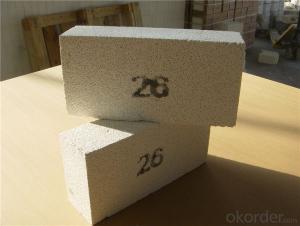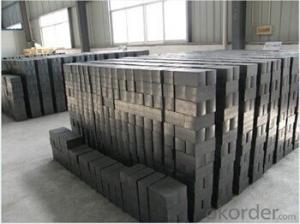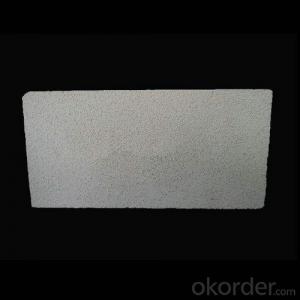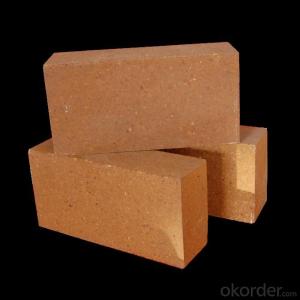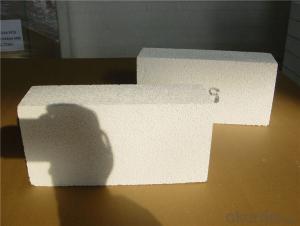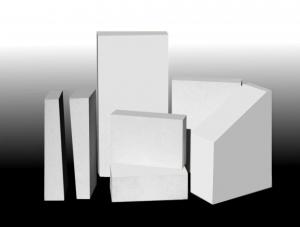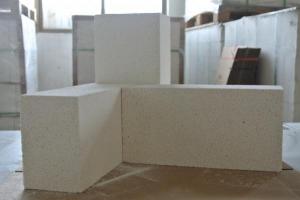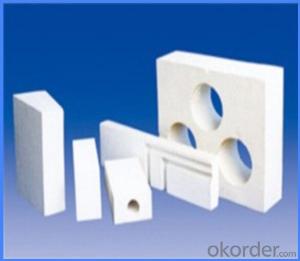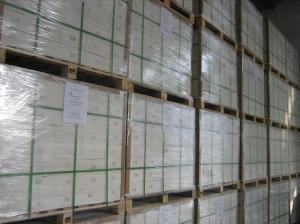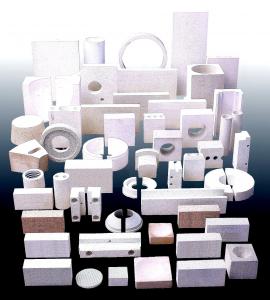GJM 30 Light Dense Mullite Insulation Brick Product
- Loading Port:
- Shanghai
- Payment Terms:
- TT OR LC
- Min Order Qty:
- 1 m.t.
- Supply Capability:
- 10000 m.t./month
OKorder Service Pledge
OKorder Financial Service
You Might Also Like
Thermal Insulation Fire Clay Brick
Refractory brick is a refractory material used in lining furnaces, kilns, fireboxes, and fireplaces.
We provide high quality Refractory Fire Bricks that are used on wide range in the various industries like Cement, Glass and Steel. Refractory Fire Bricks are provided as per the quantity and specifications required by the customers. We provide an extensive range of Refractory Fire Bricks at reasonable prices that depend upon the quantity ordered.
Application
Insulating Fire Brick are used for the lining of converter, alternating current arc furnace, direct Current arc furnace and the ladle slag line, etc.
Company Advantage
(1)Long Insulating Fire Brick manufacture history: 25 years manufacturer
(2)Advanced equipment and good service
(3)Diversification of production standards: ISO ANSI FEPA JIS ASTM
(4)Flexible payment: T/T L/C D/P D/A
(5)Professional marketing team and after-sale service
Insulating Fire Brick main feature:
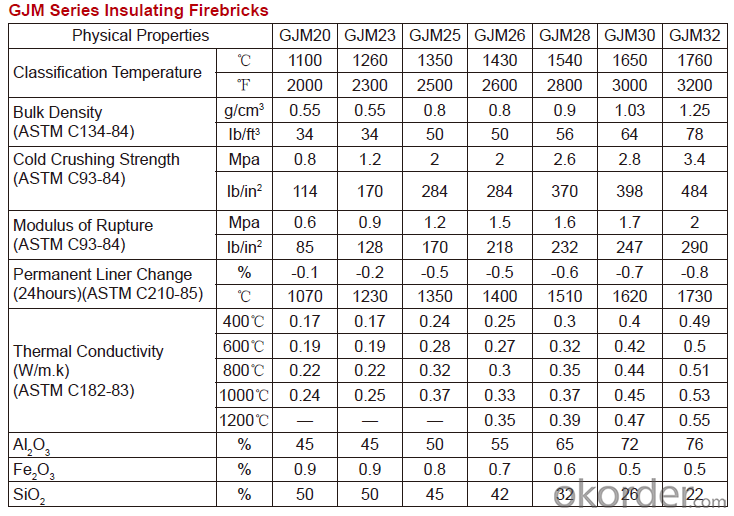
Equipment
1 unit of Ceramic Abrasive (SG Abrasive) pilot production line
2 units of Compact grain Abrasive pilot production lines
1 unit of high-end coated abrasives (abrasive cloth) production line
3 large flexible crushing and sieving lines for grit production lines
6 units of 5000KVA-10000KVA dumping type electric arc furnaces for Brown Fused Alumina fusion
FAQs
Q1 What’s the transport method?
A1 FCL delivery goods with wooden pallet or wooden case by sea; If LCL delivery, must with wooden case; Sometimes need open top, flat rack or bulk cargo.
Q2 What’s the required payment term?
A2 Generally 30% TT as the prepayment, 70% TT before delivery. If need, 100% Irrevocable Letter of Credit or negotiation.
Q3 Which country are our products exported to?
A3 Apart from entire Chinese market, the US, Russia, Japan, Korea, Australia and some Southeast Asian Nations.
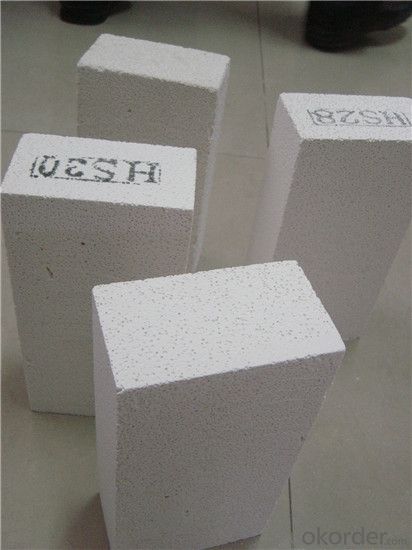
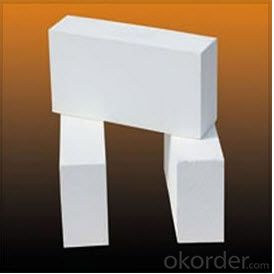
- Q:Do insulating fire bricks have a low thermal conductivity?
- Insulating fire bricks possess a low thermal conductivity, rendering them ideal for applications necessitating thermal insulation. These bricks are specially crafted to minimize heat transfer. In comparison to traditional fire bricks, insulating fire bricks exhibit lower density and higher porosity, thus aiding in diminishing heat flow through conduction. With their low thermal conductivity, these bricks function as efficient barriers against heat transfer, ensuring cooler surrounding regions and heightened energy efficiency.
- Q:Can insulating fire bricks be used as a lining for chimneys?
- Yes, insulating fire bricks can be used as a lining for chimneys. These bricks are designed to withstand high temperatures and provide insulation, making them suitable for lining chimneys and protecting them from heat damage.
- Q:Do insulating fire bricks require any special anchors or supports for installation?
- Special anchors or supports are necessary for the installation of insulating fire bricks in certain applications. These bricks are lightweight and have low thermal conductivity, making them suitable for high-temperature environments like furnaces, kilns, and fireplaces. However, their lightweight nature can cause them to move or shift under certain conditions. To ensure the stability and integrity of the insulating fire bricks, it is important to use special anchors or supports during installation. These anchors or supports are typically made of metal, such as stainless steel, and are designed to securely hold the bricks in place. They prevent the bricks from shifting or falling out, especially when exposed to vibrations, thermal expansion/contraction, or other external forces. The specific type and design of the anchors or supports depend on the application and installation requirements. Common types include V anchors, U anchors, and L anchors, which can be embedded into the surrounding refractory material or attached to a structural frame. The anchors or supports should be spaced and installed correctly according to the manufacturer's guidelines to ensure sufficient support and stability of the insulating fire bricks. In conclusion, although insulating fire bricks offer excellent thermal insulation properties, they require special anchors or supports for installation to prevent movement or displacement. These anchors or supports are crucial for maintaining the structural integrity and longevity of the insulating fire brick system.
- Q:Can insulating fire bricks be used in the construction of thermal oxidizers?
- Certainly, thermal oxidizers can utilize insulating fire bricks in their construction. The remarkable thermal insulation properties of these bricks render them perfect for situations where precise containment of elevated temperatures is necessary. Thermal oxidizers function by incinerating volatile organic compounds (VOCs) at high temperatures, and the incorporation of insulating fire bricks aids in preserving the essential temperature within the combustion chamber and minimizing heat dissipation to the surroundings. Furthermore, the lightweight nature, durability, and impressive resistance to thermal shock exhibited by insulating fire bricks further enhance their appropriateness for deployment in thermal oxidizers.
- Q:Can insulating fire bricks be used in low-temperature applications as well?
- Yes, insulating fire bricks can be used in low-temperature applications. These bricks are designed to have low thermal conductivity, making them suitable for retaining heat and insulating against temperature fluctuations. They can effectively withstand lower temperatures while still providing insulation and preventing heat loss.
- Q:Are insulating fire bricks suitable for thermal insulation in boilers?
- Yes, insulating fire bricks are suitable for thermal insulation in boilers. Insulating fire bricks are specifically designed to have high insulating properties, which allows them to effectively reduce heat transfer in high-temperature environments such as boilers. These bricks are made from lightweight materials and have low thermal conductivity, making them ideal for thermal insulation applications. The use of insulating fire bricks in boilers can help improve energy efficiency by reducing heat loss and ensuring that the heat generated by the boiler is effectively utilized. Additionally, these bricks are resistant to high temperatures and can withstand the harsh conditions inside a boiler, making them a reliable choice for thermal insulation.
- Q:What are the key properties of insulating fire bricks?
- Insulating fire bricks, also known as IFBs, possess several key properties that make them highly effective in various industrial applications. Firstly, insulating fire bricks have a high level of thermal insulation. This means that they are capable of withstanding extremely high temperatures while minimizing heat transfer. This thermal insulation property allows for the retention of heat within the desired area, preventing heat loss and improving overall energy efficiency. Secondly, insulating fire bricks have excellent refractory properties. Refractoriness refers to the ability of a material to withstand high temperatures without deforming or deteriorating. IFBs are specifically designed to have a high refractory rating, enabling them to withstand temperatures up to 3000°F (1650°C) without succumbing to thermal shock or breaking down. Another key property of insulating fire bricks is their low thermal conductivity. This property ensures that heat is not easily conducted through the bricks, leading to reduced heat loss and increased energy conservation. The low thermal conductivity of IFBs also allows for rapid heating and cooling cycles, making them ideal for applications that require quick temperature changes. Furthermore, insulating fire bricks are lightweight and have a high strength-to-weight ratio. This makes them easy to handle, transport, and install, reducing labor and logistical costs. Despite their lightweight nature, IFBs are still capable of maintaining structural integrity and providing reliable insulation. Lastly, insulating fire bricks are highly resistant to chemical attack and corrosion, ensuring their durability and longevity in harsh environments. They are commonly used in applications involving acids, alkalis, and other corrosive substances, providing reliable insulation and protection. In summary, the key properties of insulating fire bricks include high thermal insulation, excellent refractory properties, low thermal conductivity, lightweight yet strong structure, and resistance to chemical attack. These properties make IFBs highly desirable for a wide range of industrial applications, including furnaces, kilns, incinerators, and other high-temperature environments.
- Q:Are insulating fire bricks suitable for use in steel mills?
- Yes, insulating fire bricks are suitable for use in steel mills. Insulating fire bricks have high temperature resistance and excellent thermal insulation properties, making them ideal for lining furnaces and kilns in steel mills. They help to maintain high temperatures while minimizing heat loss, resulting in energy efficiency and cost savings. Additionally, insulating fire bricks also provide protection against thermal shock and chemical corrosion, enhancing the overall durability and longevity of steel mill equipment.
- Q:Are insulating fire bricks resistant to alkali vapor attack?
- Insulating fire bricks are known for their general resistance to alkali vapor attack. They are crafted from high-quality refractory materials like fire clay or silica, which possess exceptional resistance to chemical assaults, including alkali vapor. These bricks are engineered to endure extreme temperatures and challenging surroundings, rendering them suitable for applications where alkali vapor may be present, such as in industrial furnaces, kilns, and incinerators. However, the level of resistance may vary depending on the specific composition and manufacturing process employed for these insulating fire bricks. To ensure compatibility with alkali vapor exposure, it is advisable to refer to the manufacturer's specifications or seek expert advice.
- Q:Can insulating fire bricks be custom-made?
- Yes, insulating fire bricks can be custom-made to meet specific requirements and dimensions.
1. Manufacturer Overview |
|
|---|---|
| Location | |
| Year Established | |
| Annual Output Value | |
| Main Markets | |
| Company Certifications | |
2. Manufacturer Certificates |
|
|---|---|
| a) Certification Name | |
| Range | |
| Reference | |
| Validity Period | |
3. Manufacturer Capability |
|
|---|---|
| a)Trade Capacity | |
| Nearest Port | |
| Export Percentage | |
| No.of Employees in Trade Department | |
| Language Spoken: | |
| b)Factory Information | |
| Factory Size: | |
| No. of Production Lines | |
| Contract Manufacturing | |
| Product Price Range | |
Send your message to us
GJM 30 Light Dense Mullite Insulation Brick Product
- Loading Port:
- Shanghai
- Payment Terms:
- TT OR LC
- Min Order Qty:
- 1 m.t.
- Supply Capability:
- 10000 m.t./month
OKorder Service Pledge
OKorder Financial Service
Similar products
New products
Hot products
Related keywords
